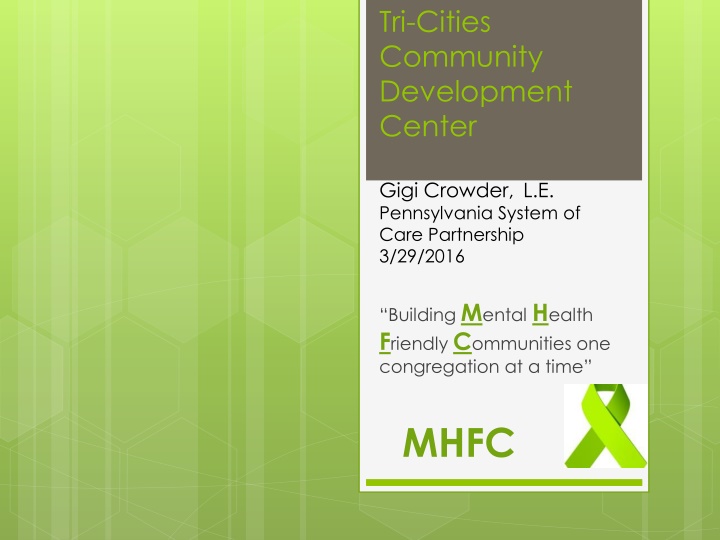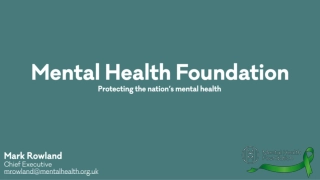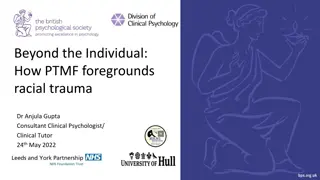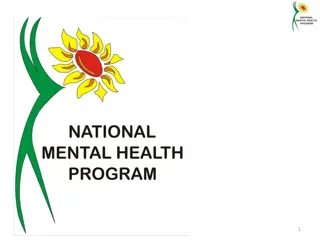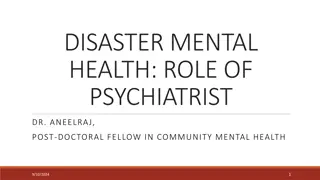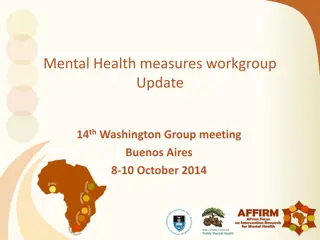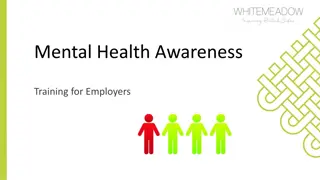Building Mental Health Friendly Communities through Faith
Building Mental Health Friendly Communities through Faith explores the intersection of spirituality and mental health care within faith communities. The initiative aims to address health disparities, reduce stigma, and provide support for individuals and families dealing with mental health concerns. Survey results highlight the importance of spirituality in mental health treatment and prevention, emphasizing the role of faith leaders as catalysts for social change. By integrating spiritual resources into mental health care, the program seeks to promote wellness and combat misinformation surrounding mental health.
Download Presentation

Please find below an Image/Link to download the presentation.
The content on the website is provided AS IS for your information and personal use only. It may not be sold, licensed, or shared on other websites without obtaining consent from the author.If you encounter any issues during the download, it is possible that the publisher has removed the file from their server.
You are allowed to download the files provided on this website for personal or commercial use, subject to the condition that they are used lawfully. All files are the property of their respective owners.
The content on the website is provided AS IS for your information and personal use only. It may not be sold, licensed, or shared on other websites without obtaining consent from the author.
E N D
Presentation Transcript
Tri-Cities Community Development Center Gigi Crowder, L.E. Pennsylvania System of Care Partnership 3/29/2016 Building Mental Health Friendly Communities one congregation at a time MHFC
The Faith Community: Catalyst For Change The Faith Community has a long standing history of being the catalyst for social change Faith Leaders have an incredible power to deliver messages of hope to the marginalized and disenfranchised Community members often look to the faith and spiritual community and its leadership in times of distress for support
Mental Health and Spirituality Survey Results California Behavioral Health Directors More than 90% of the County Behavioral Health Directors responded strongly agree or agree that: Spirituality is an important recovery resource in mental health treatment. (92%) Spirituality is an important wellness resource in mental health prevention. (94%) Spirituality is an important element of multicultural competency for mental health providers. (98%)
Consumers and Family Member Survey Over 2600 respondents 88% of African-American mental health consumers and family members across California report that spirituality is important to them. 72% report that they believe it is appropriate for the public mental health system to address spirituality as a part of mental health care. 89% reported that they regularly used prayer as a wellness tool
Mental Health Friendly Communities MHFC is a culturally responsive community defined strategy designed to: Address health disparities associated with mental illness and reduce mental health stigma and discrimination Replace misinformation about mental health Reduce stigmatizing messages that create barriers to wellness Support wellness for individuals and families living with mental health concerns Help faith communities become resources for the community
Faith Communities and Mental Health Consumers and family members agree or strongly agree that spirituality is important to me/my family member s mental health. CA Mental Health & Spirituality Initiative Consumer and Family Survey, 2010 Faith Leaders need to be trained and equipped with tools to recognize how to effectively support people and families living with mental health concerns. Improved outcomes have been reported when individuals are supported to include faith/spirituality in mental wellness recovery planning.
Becoming a Mental Health Friendly Congregation To become a Mental-Health Friendly Congregation, participating churches must complete distinct training modules Commit to following the Ten Commitments to being a Mental Health Friendly Faith Community
Training Audience Training Description Mental Health 101 Pastors/ Ministers/Church Leadership and staff Broadens the competency of faith leaders as first responders to mental health crises, and inspires leaders to create welcoming communities for individuals and families living with mental health challenges. Corrects misinformation and educates faith leaders to recognize signs and symptoms and provide better support for those with mental health concerns. Spirituality 101 Mental Health Service Providers Builds understanding among mental health and allied health professionals of the important role of faith in mental health care for consumers and families. Focuses on how and why to include faith as a resource for wellness, recovery and multicultural competency. Also facilitates development of a provider network to partner with the faith community/church in addressing specific needs of diverse ethnic and cultural communities. Keepers of the Flock Pastors/clergy, mental health service providers consumers, family members, community stakeholders Incorporates appropriate elements of all trainings to provide a rationale for the need to support and respect the individual choice to include faith/spirituality in wellness and recovery planning. This training serves to provide context for any community caregiver committed to effectively supporting the wellness recovery journey of those living with mental health issues. A Bridge Over Troubled Waters (can be adapted for all faith and cultural communities) CBOs/ Providers/ Churches Provides a historical perspective of the role that faith fulfills within the experience of targeted communities. This training provides perspective as to why the roots of faith run so deep within specific communities and has been identified as a source of healing; instrumental in maintaining personal and community mental wellness.
Becoming a Mental Health Friendly Faith Community Create a committed team of church members including consumers, family members and church identified mental wellness allies to oversee program implementation and ongoing practices to improve outcomes for consumers and family members
I would love to support your efforts to build mental health friendly communities! Discussion/Next Steps
